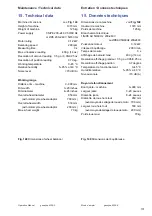
123
Optimisation /Minimisation des masses
Mode d’emploi
Affi chage Un.7 - === (Fig. 141)
Recommandation de tourner le pneu sur la jante (les
traits de l’affi chage droit restent allumés).
Sélection 1:
Tourner le pneu sur la jante (standard
program)
Orienter la roue suivant l’indicateur de direction
à
droite
et tracer un repère double exactement
perpendiculaire à et au-dessus de l’arbre principal
du côté
droit
du pneu.
Enlever la roue de la machine.
Tourner le pneu sur la jante et le tourner jusqu’à
ce que le repère double coïncide avec la valve.
Serrer l’ensemble pneu/jante sur la machine et le
tourner jusqu’à ce que la valve soit exactement
perpendiculaire à et au-dessus de l’arbre principal.
Appuyer sur la touche OP pour entrer la position
de la valve.
L’affi chage UN.8 apparaît alors.
Appuyer sur la touche START (lancée de contrôle).
Si la minimisation a été correctement effectuée suivant
la séquence de programme, la machine repasse,
après la lancée de contrôle, au mode d’équilibrage
qui était sélectionné avant l’initialisation de la lancée
de minimisation et le balourd dynamique résiduel de
la roue est affi ché
(Fig. 141)
.
Effectuer l’équilibrage de la roue suivant les
affi chages.
La minimisation est ainsi achevée et l’équilibrage de
la roue effectué.
Affi chage du code d’erreur E9
Si E9 est affi ché, c’est qu’il y a eu au moins une erreur
relative à la séquence de programme lors de la procédure
de minimisation (voir § 11. Codes d’erreur). Quitter le
programme de minimisation en appuyant sur la touche
STOP et, si cela est souhaité, relancer la minimisation.
Sélection 2: Ne pas
tourner le pneu sur la jante
Afi n de repasser du programme de minimisation
au programme d’équilibrage, appuyer sur la
touche STOP.
Le balourd de la roue est alors affi ché.
Effectuer l’équilibrage de la roue suivant les
affi chages.
Affi chage H0 (voir Fig. 142)
La condition optimale est déjà atteinte et ne peut pas
être améliorée.
Appuyer sur la touche STOP pour repasser au
programme d’équilibrage.
Le balourd de la roue est alors affi ché.
Effectuer l’équilibrage de la roue suivant les
affi chages.
Optimisation/Weight minimisation
Operation Manual
Reading Un.7 - === (Fig. 141)
Recommendation to readjust tyre on the rim (the right
display segments light up permanently).
Choice 1:
Readjust tyre on the rim (standard program)
Index the wheel following the
right
direction
indicator and provide a double mark on
right
side
of the tyre exactly perpendicular to and above the
main shaft.
Remove the wheel from the machine.
Readjust the tyre on the rim until the double mark
coincides with the valve.
Clamp the tyre/rim assembly on the machine
and readjust such that the valve is exactly
perpendicular to and above the main shaft.
Press the OP key to enter the valve position.
Reading Un.8 comes up.
Press the START key (check run).
If the minimisation run has been carried out correctly
following the above sequence of operations, the
balancer will return to the balancing mode selected
before minimisation and read out the dynamic
unbalance still left in the wheel
(Fig. 141)
.
Balance the wheel according to the readings.
Hence both minimisation and balancing are
accomplished.
Reading of error code E9
If E9 is read out, at least one error was made with
respect to the sequence of operations when performing
minimisation (see § 11. Error codes). Abort the
minimisation program by pressing the STOP key and,
if desired, start minimisation once again.
Choice 2:
Do
not
readjust tyre on the rim
In order to abort minimisation, press the STOP
key to return to the balancing program.
The unbalance present in the wheel is read out.
Balance the wheel according to the readings.
Reading H0 (Fig. 142)
Optimum condition has been achieved and cannot
be improved.
Press the STOP key to return to the balancing
program.
The unbalance present in the wheel is read out.
Balance the wheel according to the readings.
geodyna 6300-2
geodyna 6300-2
























